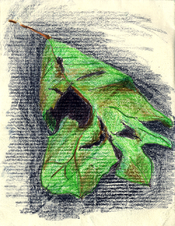Self-taught visionary artist. Painted every sunset for 11 years through 2016. Bio here. William Van Doren art also on Facebook and Instagram, and art prints on Pixels.com/Fine Art America. Author of the non-holiday book 47 Minutes on Christmas Eve. Coming in 2019, Into the Sunset: Paintings and Notes from 4,000 Nights.
VAN DOREN ON THE SUNSET SERIES
SUNSET SLIDESHOWS
Copyright © 2016 William Theodore Van Doren. All rights reserved. Reproduction in whole or in part without permission is prohibited.





Sunset, Sunday, 15 November 2009
Having been for a long time – too long a time, about eight years, from age 16 to 24 – a devotee of Ayn Rand and Objectivism, I don’t think I can stand to read the two recent Rand biographies, even though they’re the first to be done by people outside her camp. About the most I could manage was to read the lengthy review by Thomas Mallon in The New Yorker. Mallon makes a number of excellent observations, including various ways Rand manifested behavior that was exactly the opposite of the qualities she espoused – for example, prizing meek compliance by others with her every view while publicly claiming to worship the character trait of independent thinking.
There’s only one contribution I’ve ever wanted to make to the discussion of the life and work of Ayn Rand, and Mallon comes very close to taking care of it in his review, when he writes:
Along those lines, what I’ve wanted to say – hey, I’ve been saving this up since 1972, ever since I began to notice that the thought progressions in The Ayn Rand Letter were, beneath their confidently hard-waxed surface, positively deranged – is that Rand ultimately relied on the use of literally compelling rhetoric rather than on the actual content of ideas. In other words, her chief weapon – and it was exactly that – was a device she condemned, and which she called “the argument from intimidation.” You can find it defined in a really scary website assembled by her disciples, the Ayn Rand Lexicon.
Rand made her living rendering rhetoric that would be so forceful, so powerfully, even sometimes beautifully symmetrical, so ruthlessly logical in its sound and its appearance, once you allowed yourself to step inside its force field, you could be overwhelmed. There would appear to be no escape. But it only looked logical. It sounded rational. It was in fact a fantastic structure based on a profound desire to make the world conform to what she wished it to be in her mind, which became the will to intimidate.
O.K., I feel better now.
For anyone interested in the American right wing’s attempts to claim Ayn Rand as part of its ideological heritage, I strongly recommend a recent post on DailyKos, “The Ayn Rand Myth” by Laurence Shatkin.